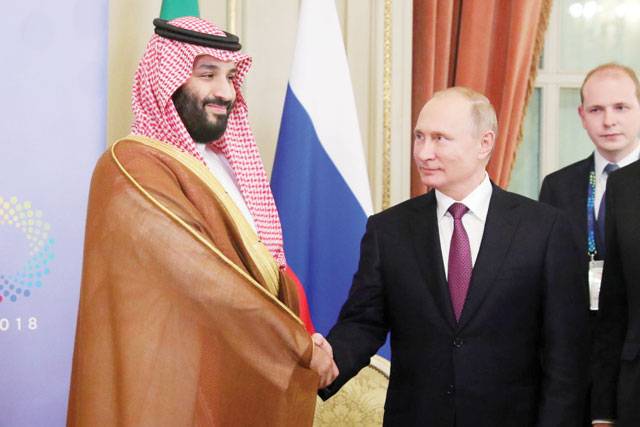KEITH JOHNSON - Saudi Arabia and other big oil producers, huddled in Vienna this week at their last big OPEC meeting of the year, are trying to walk a tightrope between fixing a glutted oil market that has hurt their own economies or keeping U.S. President Donald Trump happy. The end result may be a muddled middle course that neither stabilizes the price of oil nor mollifies a U.S. leader obsessed with keeping gasoline cheap.
The high-stakes meeting, coming just as the U.S. Congress is ratcheting up pressure on Riyadh over its role in the murder of a Washington Post columnist and in the war in Yemen, is also Saudi Arabia’s latest effort to come to grips with a double-barreled new reality.
While Saudi Arabia is still the largest oil producer inside OPEC, its influence over the global oil market has shrunk as the United States and Russia are pumping oil at record levels. And rising tensions between Saudi Arabia and many in Washington mean that the geopolitical alignment that has held fast since World War II risks coming undone. The answer to both problems, from Riyadh’s point of view, is closer ties with Moscow.
As a result, deeper cooperation between Riyadh and Moscow to manage the world’s oil supply—even if that means bucking the directives of the White House—could be one lasting outcome of this week’s OPEC gathering. And Russian President Vladimir Putin and Saudi Crown Prince Mohammed bin Salman may have reason to repeat their notorious high-five at last week’s G-20 meeting.
This OPEC meeting, which kicked off Thursday and which will wrap up after talks with non-OPEC member Russia on Friday, matters more than most because of the perilous state of the global oil market. As the Trump administration prepared this summer to choke Iran with renewed sanctions, including a ban on oil exports, Saudi Arabia and other big oil producers answered the White House’s call to open the spigots to avoid nasty price spikes.
But they overdid it, redoubling oil output in Saudi Arabia and Russia even as US production reached record highs—and all while Iran’s crude exports shrank less than expected. That left a glut of oil sloshing around the world, sending the price of oil into freefall. Between late October and late November, Brent crude fell by almost 30 percent, from about $80 a barrel to less than $60, where it remains.
Relatively cheap oil is good news for drivers around the world, who pay a little less for gasoline. But it’s terrible news for petrostates such as Saudi Arabia, Iraq, and Russia that rely heavily on revenues from crude exports. That makes the recent price collapse as much a political threat as an economic headache.
OPEC ministers came to Vienna recognizing the economic realities. With the world pumping about 1.2 million more barrels every day than it consumes, “they have to tighten the market. If they don’t get rid of that oversupply, the market will drown in oil,” said Antoine Halff of the Center on Global Energy Policy at Columbia University.
On Thursday, delegates at the meeting said that OPEC countries and some other big producers are considering cutting their combined production by about 1 million barrels a day, though details are scant and much depends on how much of an output cut Russia agrees to on Friday. Saudi Oil Minister Khalid al-Falih said he hoped the group could reach a deal by Friday.
But recognizing economic reality is one thing; political reality, in the form of Trump tweets, keeps gatecrashing. On Wednesday, just before OPEC officials started talking about how to stabilize the oil market, Trump lobbed a rhetorical grenade in their direction: “Hopefully OPEC will be keeping oil flows as is, not restricted. The World does not want to see, or need, higher oil prices!” he tweeted.
That veiled warning, an apparent effort to again dictate OPEC’s production decisions from the White House, irked Iran, which said the oil-exporting cartel shouldn’t take orders from Washington. But it was also a warning shot to Saudi Arabia not to do anything to anger one of the few people in Washington who still seems supportive of Riyadh and its embattled leadership.-FP






